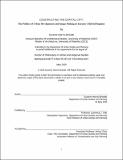| dc.contributor.advisor | Lawrence J. Vale. | en_US |
| dc.contributor.author | Harris-Brandts, Suzanne. | en_US |
| dc.contributor.other | Massachusetts Institute of Technology. Department of Urban Studies and Planning. | en_US |
| dc.coverage.spatial | me----- | en_US |
| dc.date.accessioned | 2020-09-15T22:06:11Z | |
| dc.date.available | 2020-09-15T22:06:11Z | |
| dc.date.copyright | 2020 | en_US |
| dc.date.issued | 2020 | en_US |
| dc.identifier.uri | https://hdl.handle.net/1721.1/127614 | |
| dc.description | Thesis: Ph. D., Massachusetts Institute of Technology, Department of Urban Studies and Planning, May, 2020 | en_US |
| dc.description | Cataloged from the official PDF of thesis. | en_US |
| dc.description | Includes bibliographical references (pages 256-290). | en_US |
| dc.description.abstract | The late 20th century saw significant geopolitical shifts as empires disintegrated and socialist unions collapsed. The result was not only a rise in independent states but the emergence of a distinct form of governance known as the "hybrid regime." In Eurasia, twelve such regimes surfaced. Having undergone dramatic politico-economic change, many turned toward capital city building. This dissertation investigates the utility of constructing the capital to such regimes, synthesizing theory from architecture, urban planning, political science, and political geography. It asks: How do incumbent parties in hybrid regimes retain power through urban development and image-making? What effects are there on the built environment and the long-term trajectories of these countries? To answer these questions, I conducted an in-depth analysis of the two Eurasian capitals most heavily mired in hybrid regime politics: Tbilisi, Georgia, and Skopje, North Macedonia. | en_US |
| dc.description.abstract | Both underwent dramatic state and nation-building after socialism's collapse in the 1990s. They represent the widest array of incumbent party tactics used to increase party authority through urban development and are therefore useful cases to study. In Tbilisi, I foreground initiatives by the United National Movement (UNM) government of President Mikheil Saakashvili (2004-2013). In Skopje, the emphasis is on the Skopje 2014 campaign instigated by the VMRO-DPMNE government of Prime Minister Nikola Gruevski (2006-2016). Using qualitative mixed-methods (semi-structured interviews, focus groups, site observations, document and media analysis), the findings show that urban development and its correlated image-making are often extensively manipulated to entrench incumbent party authority. | en_US |
| dc.description.abstract | Although these campaigns promised national pride, economic growth, and improved living conditions, they resulted in geopolitical tensions, subnational discord, charges of corruption, and far-reaching legal manipulations. Patronage networks, informal institutions, and populist ideology supported the power of the ruling elite at the detriment of developing the country. The built environment impacts were equally concerning, resulting in dysfunctional cityscapes that were over-saturated with contentious monuments and poorly constructed buildings. The research findings thus underscore the highly politicized processes of constructing capitals in hybrid regimes, offering insight into how civil society and international donors might work to hold incumbent parties accountable. | en_US |
| dc.description.statementofresponsibility | by Suzanne Harris-Brandts. | en_US |
| dc.format.extent | 317 pages | en_US |
| dc.language.iso | eng | en_US |
| dc.publisher | Massachusetts Institute of Technology | en_US |
| dc.rights | MIT theses may be protected by copyright. Please reuse MIT thesis content according to the MIT Libraries Permissions Policy, which is available through the URL provided. | en_US |
| dc.rights.uri | http://dspace.mit.edu/handle/1721.1/7582 | en_US |
| dc.subject | Urban Studies and Planning. | en_US |
| dc.title | Constructing the Capital City : the politics of urban development and image making in Eurasia's hybrid regimes | en_US |
| dc.type | Thesis | en_US |
| dc.description.degree | Ph. D. | en_US |
| dc.contributor.department | Massachusetts Institute of Technology. Department of Urban Studies and Planning | en_US |
| dc.identifier.oclc | 1193557129 | en_US |
| dc.description.collection | Ph.D. Massachusetts Institute of Technology, Department of Urban Studies and Planning | en_US |
| dspace.imported | 2020-09-15T22:06:10Z | en_US |
| mit.thesis.degree | Doctoral | en_US |
| mit.thesis.department | UrbStud | en_US |
